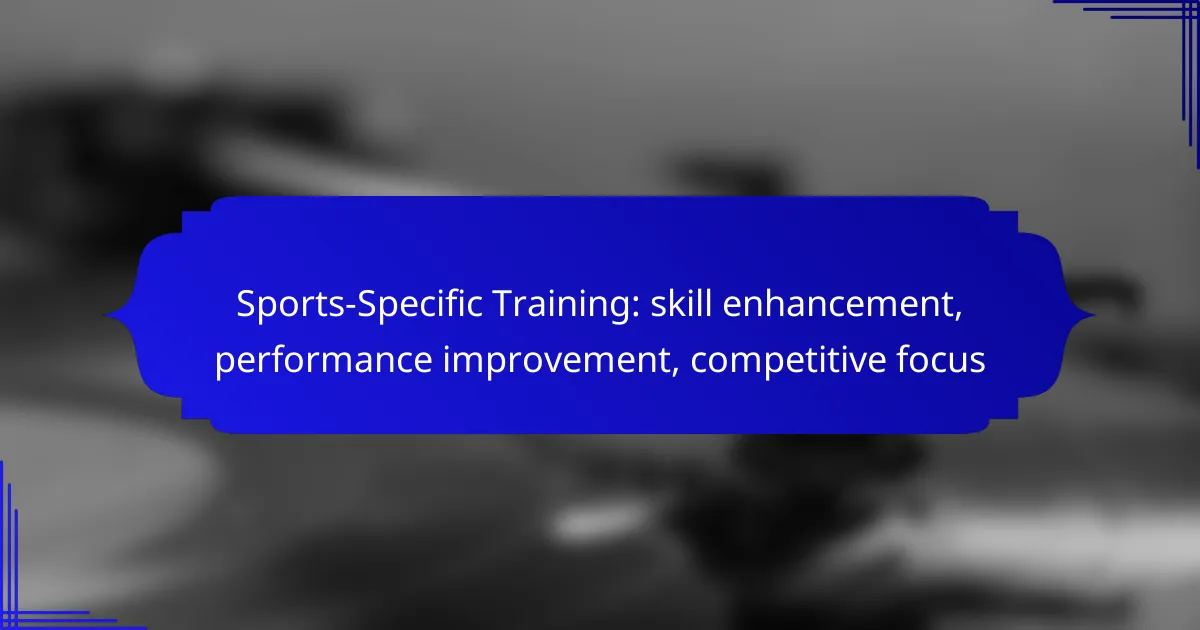Sports-specific training is designed to enhance an athlete’s skills by addressing the unique demands of their sport, leading to improved performance outcomes. By focusing on both physical capabilities and mental acuity, athletes can achieve significant gains in strength, endurance, and reaction times, which are crucial for competitive success.

How can sports-specific training enhance skills in athletes?
Sports-specific training enhances skills by focusing on the unique demands of each sport, allowing athletes to develop techniques and abilities that directly translate to improved performance. This targeted approach not only builds physical capabilities but also sharpens mental acuity, essential for competitive success.
Improved technique through targeted drills
Targeted drills are designed to refine specific skills required in a sport, such as shooting in basketball or passing in soccer. By repeating these drills, athletes can develop muscle memory, leading to more consistent and accurate performance during competitions. Incorporating feedback from coaches can further enhance technique adjustments.
For example, a basketball player might practice free throws using a specific routine that emphasizes foot placement and shooting form. This focused repetition can lead to noticeable improvements in shooting percentages during games.
Increased agility with sport-specific exercises
Agility is crucial in many sports, and sport-specific exercises can significantly enhance this attribute. Drills that mimic game scenarios, such as lateral movements or quick directional changes, help athletes improve their responsiveness and speed on the field or court. Incorporating agility ladders or cone drills can be particularly effective.
A soccer player might engage in shuttle runs that simulate the quick bursts of speed needed during a match. Regularly practicing these movements can lead to faster reaction times and better overall performance in competitive situations.
Enhanced mental focus during competition
Mental focus is vital for athletes to perform at their best, especially under pressure. Sports-specific training often includes mental conditioning techniques, such as visualization and mindfulness, which help athletes maintain concentration during competitions. Developing a pre-performance routine can also aid in achieving a focused mindset.
For instance, a tennis player might visualize successful serves before a match, which can enhance confidence and focus during play. Establishing consistent mental practices can lead to improved performance outcomes and a stronger competitive edge.

What performance improvements can athletes expect?
Athletes can expect significant enhancements in their physical capabilities, including increased strength, improved endurance, and faster reaction times. These improvements contribute directly to better overall performance metrics in their respective sports.
Increased strength and endurance
Strength and endurance are foundational elements of athletic performance. Training regimens that focus on resistance exercises, such as weightlifting or bodyweight workouts, can lead to substantial gains in muscle strength. Endurance can be enhanced through aerobic activities like running, cycling, or swimming, often resulting in the ability to sustain high-intensity efforts for longer periods.
For athletes, a balanced program that incorporates both strength training and endurance work can yield improvements in performance. For example, a well-structured routine might include three strength sessions and two endurance sessions per week, allowing for recovery while maximizing gains.
Faster reaction times in gameplay
Faster reaction times are crucial for success in competitive sports. Training that emphasizes agility drills, plyometrics, and sport-specific skills can significantly reduce the time it takes for athletes to respond to stimuli during gameplay. This can be particularly beneficial in sports like basketball or soccer, where split-second decisions can determine the outcome of a play.
To improve reaction times, athletes can incorporate drills that simulate game scenarios, such as quick starts or rapid direction changes. Consistent practice can lead to improvements in the low tens of milliseconds, which can be the difference between winning and losing.
Better overall athletic performance metrics
Overall athletic performance metrics encompass various factors, including speed, agility, strength, and endurance. By focusing on targeted training, athletes can improve these metrics, leading to enhanced performance in competitions. For instance, a sprinter may focus on explosive strength to improve their 100-meter dash times.
Tracking progress through regular assessments can help athletes identify areas for improvement. Utilizing tools such as fitness trackers or performance apps can provide insights into metrics like heart rate, speed, and recovery times, allowing athletes to adjust their training accordingly for optimal results.

Which training programs are effective for competitive athletes in Canada?
Effective training programs for competitive athletes in Canada focus on enhancing skills, improving performance, and maintaining a competitive edge. These programs often include high-performance training, sport-specific coaching clinics, and local training camps that cater to various sports disciplines.
High-Performance Training Programs
High-performance training programs are designed to optimize an athlete’s physical and mental capabilities. These programs typically include strength and conditioning, agility drills, and sport-specific skills training, often tailored to the athlete’s unique needs and goals.
In Canada, many high-performance training facilities offer specialized programs that incorporate advanced techniques and technology. Athletes should consider enrolling in programs that provide access to experienced coaches and state-of-the-art equipment to maximize their training outcomes.
Sport-Specific Coaching Clinics
Sport-specific coaching clinics focus on enhancing the skills and techniques required for particular sports. These clinics are often led by experienced coaches and athletes who provide targeted instruction and feedback.
In Canada, clinics can vary in duration from a single day to several weeks, allowing athletes to immerse themselves in focused training. Participants should look for clinics that emphasize both skill development and competitive strategies to ensure a well-rounded experience.
Local training camps and workshops
Local training camps and workshops offer athletes the opportunity to train intensively in a supportive environment. These programs typically include a mix of skill development, competition simulation, and physical conditioning.
In Canada, many community centers and sports organizations host seasonal camps that cater to different age groups and skill levels. Athletes should seek camps that provide personalized coaching and a structured curriculum to enhance their training effectiveness.

What criteria should athletes consider when choosing a training program?
Athletes should evaluate training programs based on their accreditation, coaching expertise, available resources, and flexibility in scheduling. These factors can significantly impact skill enhancement and overall performance improvement.
Program accreditation and coaching expertise
Accreditation ensures that a training program meets established standards, which can enhance its credibility. Look for programs affiliated with recognized sports organizations or institutions that specialize in athletic training.
Coaching expertise is equally crucial; experienced coaches with a proven track record can offer tailored guidance and effective strategies. Research the coaches’ backgrounds, including their qualifications and previous successes with athletes in your sport.
Availability of sport-specific resources
Access to sport-specific resources, such as specialized equipment and training facilities, can greatly enhance an athlete’s training experience. Ensure that the program provides the necessary tools to develop specific skills relevant to your sport.
Additionally, consider the availability of supplementary resources like nutrition counseling, injury prevention workshops, and mental conditioning sessions. These elements can contribute to a well-rounded training approach.
Training schedule flexibility
Flexibility in the training schedule is essential for accommodating an athlete’s personal commitments and recovery needs. Look for programs that offer various training times or the option to adjust sessions based on your availability.
Balancing training with other responsibilities is crucial for long-term success. A program that allows for rescheduling or provides make-up sessions can help maintain consistent progress without added stress.

How can technology enhance sports-specific training?
Technology enhances sports-specific training by providing tools that monitor performance, analyze techniques, and simulate competitive environments. These advancements help athletes refine their skills, improve performance, and maintain a competitive edge.
Wearable fitness trackers for performance monitoring
Wearable fitness trackers, such as smartwatches and heart rate monitors, allow athletes to track their physiological metrics in real-time. These devices can measure heart rate, calories burned, distance covered, and even sleep patterns, providing valuable insights into an athlete’s training regimen.
When selecting a fitness tracker, consider factors like battery life, waterproof capabilities, and compatibility with other devices. Popular options include the Garmin Forerunner series and the Fitbit Charge, which cater to various sports and training needs.
Video analysis software for technique improvement
Video analysis software enables athletes to record and review their performance, focusing on technique and form. By breaking down movements frame by frame, athletes can identify areas for improvement and make necessary adjustments to enhance their skills.
Tools like Hudl Technique and Coach’s Eye are widely used for their user-friendly interfaces and powerful analysis features. Athletes should aim to record their sessions regularly and review the footage to track progress over time.
Virtual reality training simulations
Virtual reality (VR) training simulations immerse athletes in realistic environments that mimic competitive scenarios. This technology helps improve decision-making skills, reaction times, and situational awareness without the physical strain of traditional training.
VR systems like STRIVR and Oculus for Sports offer tailored experiences for various sports, allowing athletes to practice under pressure. Incorporating VR training into a routine can enhance mental preparedness and boost confidence in high-stakes situations.

What role does nutrition play in sports-specific training?
Nutrition is crucial in sports-specific training as it directly impacts an athlete’s energy levels, recovery, and overall performance. A well-balanced diet tailored to the demands of the sport can enhance skill development and competitive focus.
Optimized meal plans for energy and recovery
Creating optimized meal plans involves balancing macronutrients—carbohydrates, proteins, and fats—to meet the energy requirements of specific sports. Athletes should aim for a diet rich in whole foods, including lean proteins, whole grains, fruits, and vegetables, to support both performance and recovery.
For example, a meal plan for a strength athlete might include higher protein intake, while an endurance athlete may focus on complex carbohydrates. Timing meals around training sessions can also enhance energy availability and recovery, with pre-workout meals consumed 1-3 hours before exercise and post-workout meals within 30-60 minutes after training.
Hydration strategies for peak performance
Hydration is essential for maintaining peak performance during training and competition. Athletes should monitor their fluid intake and aim to drink water regularly throughout the day, adjusting for sweat loss during workouts. A general guideline is to consume about 500-700 mL of water in the hours leading up to exercise.
During prolonged activities, electrolyte-rich beverages can help replenish lost salts and maintain hydration levels. Post-exercise, athletes should focus on rehydrating with water or sports drinks to restore fluid balance and support recovery.
Supplements for muscle recovery and growth
Supplements can play a supportive role in muscle recovery and growth when used alongside a balanced diet. Common options include protein powders, branched-chain amino acids (BCAAs), and creatine, which may enhance recovery and improve performance outcomes.
It’s important to choose high-quality supplements and consult with a healthcare professional or nutritionist to ensure they align with individual training goals and dietary needs. Relying solely on supplements without a solid nutritional foundation can lead to suboptimal results and potential health risks.
